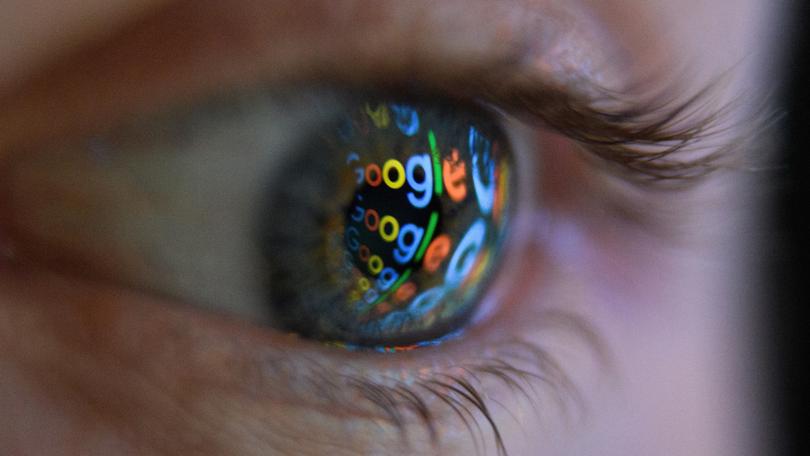Google’s Alphabet pays first ever dividend on earnings beat, plans $US70b buyback
Alphabet has reported first-quarter revenue that exceeded analysts’ expectations, buoyed by growth in its cloud computing unit.

Alphabet has reported first-quarter revenue that exceeded analysts’ expectations, buoyed by growth in its cloud computing unit.
The Google parent generated sales, excluding partner payouts, of $US67.6 billion ($103.6b) for the three months that ended on March 31, surpassing the $US66.1b expected on average by analysts, according to data compiled by Bloomberg. Net income was $US1.89 per share, compared with Wall Street’s estimate of $US1.53 per share.
The company also said it would pay a dividend of US20¢ a share, its first ever, and repurchase an additional $US70b in stock. The shares jumped 16 per cent in extended trading.
Sign up to The Nightly's newsletters.
Get the first look at the digital newspaper, curated daily stories and breaking headlines delivered to your inbox.
By continuing you agree to our Terms and Privacy Policy.Like other Big Tech companies, Alphabet has been pumping money into developing artificial intelligence, a strategy that has helped drive demand for its cloud services, which saw revenue rise 28 per cent in the first quarter. Google is a distant third in the cloud computing market, trailing Amazon and Microsoft, but the company’s prowess in AI could help it close the gap.
“The main thing is, we are really excited about the benefit from AI for our cloud customers,” chief investment officer Ruth Porat told journalists on a call. “We saw an increasing contribution from our AI solutions.”
The Google Cloud results “really reflect broad strength across the industry”, she added.
Google has developed much of the underlying technology being used in the AI boom today, and has woven it into products from web search to its suite of enterprise software from Gmail to Google Docs.
Yet ever since OpenAI’s ChatGPT was released in late 2022, Google has been battling the perception that it’s lagging behind Microsoft and OpenAI in rolling out new generative AI tools. The arrival of popular chatbots such as ChatGPT — which answers questions in a conversational tone rather than providing lists of links to other websites — has posed a threat to Google’s two-decade stranglehold on search. The company is struggling to compete in generative AI without cannibalising its core profit machine.
Search advertising revenue rose 14 per cent to $US46.2b. That compared with the average estimate of $US45b.
Google has marshalled teams across the company to reassert its lead in AI, yet its early efforts have been marred by embarrassing blunders, including a scandal over how its AI model Gemini handled race that forced the company to suspend image generation of people.
Investors have shown they are excited about the prospects of AI but want tech companies to continue to focus on revenue and profit in the meantime. Meta Platforms, which competes with Google in AI and also digital advertising, suffered its worst stock decline since October 2022 after reporting that it would spend billions of dollars more this year on AI efforts and projecting weaker revenue for the current quarter.
Search advertising remains the engine of Google’s very lucrative business, and the company is facing heightened competition there, too. Meta has been seeding AI tools throughout its advertising business and Snap has also undergone a total revamp of its ad business to improve ad targeting. The digital ad market is recovering from a post-pandemic slump, buoyed by the Olympics Games in a few months, but Google is increasingly vying for those ad dollars with Meta and Snap.
“Google’s core search business also did well, but its future is not assured,” said Emarketer analyst Evelyn Mitchell-Wolf. “A verdict is expected in the US DOJ’s related antitrust trial in the coming quarter, and the incorporation of AI-generated components into Google’s main search interface will arguably be the biggest change to the search advertising market since its inception.”
If consumers gravitate from Google search to the new wave of chatbots, that could imperil the company’s search advertising juggernaut, which is expected to generate nearly $US200b in revenue this year and the bulk of Alphabet’s profit.
Cloud has been a bright spot for Google, after it first became profitable early last year. Many young AI startups are founded by former Google employees, creating a strong pipeline of cloud clients.
Google Cloud reported sales of $US9.6b. The unit’s profit was $US900 million, well ahead of analysts’ projections of $US672.4m.
Despite the hard questions that AI raises for the search business, “there’s no question, however, that Google’s AI ventures are helping Cloud, which has been a consistent growth driver”, Mitchell-Wolf said.
YouTube, the wildly popular video site, reported $US8.1b in revenue, compared with analysts’ average estimate of $US7.7b. The unit returned to form last quarter after a series of disappointing results that showed the toll of advertisers’ pullback in spending.
“YouTube, in particular, seems to have benefitted from live sports investments, ad blocking crackdowns, and improvements in Shorts monetisation, resulting in its strongest growth rate in two years,” Mitchell-Wolf said.
Alphabet’s Other Bets, an eclectic collection of nascent businesses including the self-driving car effort Waymo and the life sciences firm Verily, reported $US495m in revenue while losing $US1b. Investors have closely scrutinised the unprofitable unit for years, and earlier this year the company’s famed moonshot factory, X, shed dozens of jobs as it pivots to focus on spinning out companies.
Porat, who was named Alphabet’s president and CIO last year, is expected focus more on overseeing these investments after the company hires a new CFO to replace her in that role.
To free up resources to invest in artificial intelligence, Google has conducted rolling rounds of layoffs that have struck teams including hardware, engineering, and the moonshot lab X. Google reported a total of 180,895 employees, down from 190,711 in the year-ago quarter.
Bloomberg
Originally published as Google’s Alphabet pays first ever dividend on earnings beat, plans $US70b buyback
